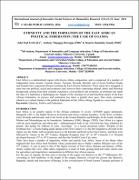| dc.description.abstract | East Africa is a multicultural region with diverse ethnic composition, and is comprised of a number of independent states namely; Uganda, Kenya, Tanzania, Rwanda, Burundi, and of recent Southern Sudan and Somalia have expressed interest in joining the East African Federation. These states have struggled to unite into one political, social and economic unit, however their contrasting cultural, ethnic and historical background; arising from their colonial experience, socio-political and economic environment has made the idea of a federation a challenging one. Inspite of the seeming novel and beneficial nature of the East African Federation, its process and realization has taken a painful slow pace. This study examined ethnicity as a salient feature to the political federation in East Africa, taking Uganda as a case study. | en_US |


